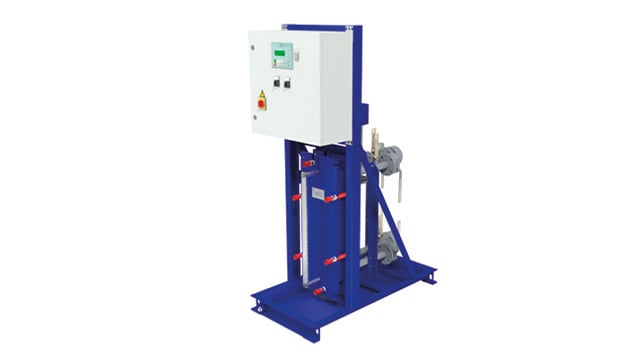Automated fuel Changeover System
The Automated Fuel Changeover System (ACS) is a reliable, fully automatic fuel changeover system that facilitates fuel oil changeover while maintaining fuel viscosity within the limits set by engine manufacturers.
In the high-pressure stage of fuel conditioning, the ACS replaces the heating phase with a cooling phase, in order to keep the distillate fuel temperature low and ensure the proper viscosity. The ACS can be integrated with the Alfa Laval Fuel Conditioning Module (FCM) or any other booster system, new or existing.
Application
Stricter fuel oil regulations imposed by the International Maritime Organization and national and regional authorities call for ships to change over from heavy fuel oils (HFO) to low-sulphur distillate fuel oils in designated Emission Control Areas. The changeover from HFO to light fuel poses operational challenges, especially related to fuel viscosity, lubricity
and combustion quality. Onboard fuel oil systems must therefore be adapted to ensure the protection of fuel oil injection components. Cooling units are required to reduce the temperature of low-sulphur marine gas oil, so that the fuel supplied to the
engine is within the proper parameters.
Key components
Except for pipes and cables, the ACS scope of supply includes everything needed for a complete fuel cooling system, whether as part of a new installation or as a retrofit
of an existing fuel supply system.
ACS cooler
The ACS is equipped with a heat exchanger that uses fresh water or seawater as the cooling medium. The plate heat exchanger cooler has high corrosion resistance, high efficiency and a compact design.
Mixing valve
This electrically operated three-way mixing valve regulates fuel temperature by partializing the amount of fuel flowing through the ACS cooler. The stepless flow adjustment allows exact temperature control of the light fuel, in order to provide reliable temperature ramping and the correct final injection temperature.
Temperature transmitter
The temperature transmitter supplies the ACS control unit with data about fuel temperature at the engine. It is mounted near the engine or on the booster module.
Changeover valves
The ACS incorporates one three-way changeover valve positioned before the inlet of the ACS cooler. Two more three-way changeover valves are available as an option, i.e. one fuel changeover valve at the fuel supply feed inlet and one changeover valve to handle a third fuel if applicable. These are supplied according to the dimensions of the connected pipework.
Control system
The ACS is operated and monitored via a control panel, and can be equipped for different levels of remote control:
- Basic – free contacts (only alarms and readings)
- Extended – free contacts (changeover start-up plus alarms and temperature readings)
- Modbus – full remote control through the onboard automation system
Modularized assembly
The ACS is a compact and skid-mounted unit, ready for space-saving integration with any booster system. If required, it is also possible to have the ACS delivered as a system of loose components.
Sign up for our Fuel Management Course
It is no secret that the fuel industry has changed a great deal in the last 10 years. The fuel on the market is more complex, and the introduction of ECAs is resulting in low-sulphur fuels with some particular operational issues. New changes in ECAs as of 1st January 2015, which force a choice between MGO/MDO or a scrubber solution, increase the complexity and operational challenges on board ships.
The Fuel Management Course provides answers and recommendations as to how to handle bunkering, sampling, storing and treatment of the fuel on board.


